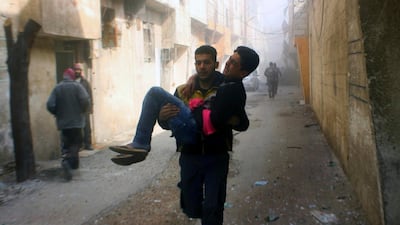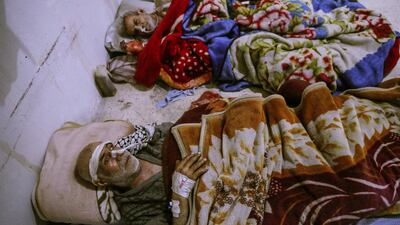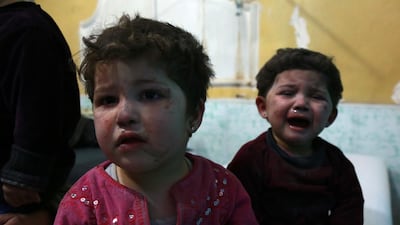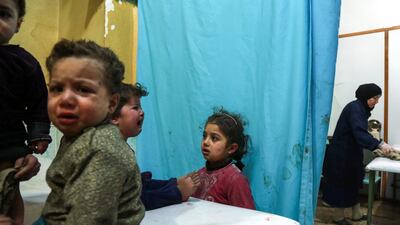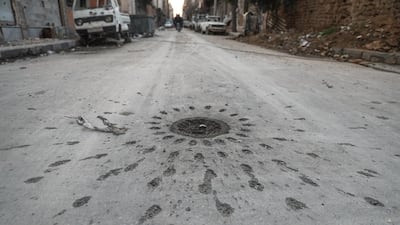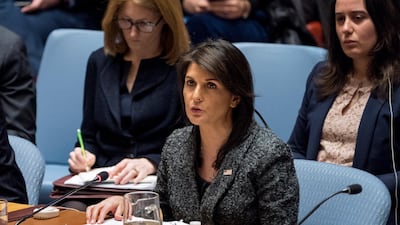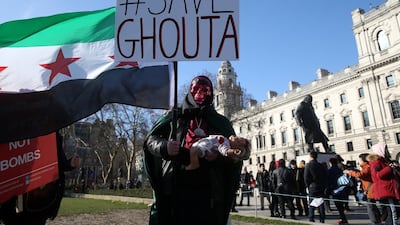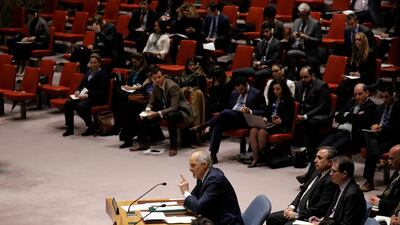Syrian regime airstrikes hit the rebel-held area of eastern Ghouta on Sunday despite a UN Security Council resolution for a 30-day ceasefire.
After days of diplomatic bickering, the council unanimously voted in favour of the ceasefire on Saturday to allow for aid deliveries and medical evacuations. But the measure did not specify when the truce would go into effect, saying only it should be "without delay".
Syrian President Bashar Al Assad - with Russian air support - has been striking eastern Ghouta - a collection of Damascus suburbs - since February 18. At least 527 people, including 129 children, have been killed, according to the Syrian Observatory for Human Rights, in what is one of the most ferocious assaults of the war.
German Chancellor Angela Merkel and French President Emmanuel Macron urged Russian President Vladimir Putin to use his influence to halt the attacks.
The leaders agreed to speed up their "exchange of information", the Kremlin said. They stressed "the importance of continuing common efforts in the interests of the full implementation of the resolution as soon as possible."
As Mr Al Assad's main ally, Russia - which has veto power in the Security Council - had delayed the ceasefire resolution.
Ms Merkel and Mr Macron argued that a ceasefire also would offer a basis to move forward the UN brokered effort to find a political solution in Syria.
Iran's government, also a backer of the Assad regime, said it would respect the UN resolution.
But Iranian Revolutionary Guards General Mohammad Baqeri, chief of the country's armed forces, was quoted as saying the truce did not cover parts of Damascus suburbs "held by the terrorists".
Turkey, too, said its military operations in another theatre of war - against Kurdish fighters in northern Syria's Afrin region - would not be affected.
The UN resolution fed hopes of curtailing the bloodshed but it remains unclear when or how broadly it could be implemented.
______________
Read more:
UN demands ceasefire as warplanes pound Ghouta
Eastern Ghouta: the guilty parties have a terrible account to settle
______________
Rocket and artillery fire hit at least three parts of eastern Ghouta, including Douma, Observatory chief Rami Abdel Rahman said.
Mr Abdel Rahman said there were also clashes in the south of the area between regime forces and fighters from the Jaish Al Islam rebel group. Fighting in the area is frequent so it was not immediately clear if the clashes represented a change on the ground.
The two main groups controlling eastern Ghouta — Jaish Al Islam and Faylaq Al Rahman — welcomed the UN's call for a ceasefire but vowed to fight if there are new attacks.
"Jaish Al Islam is committed to protecting humanitarian convoys that will enter Ghouta," the group said in a statement. It added that fighters will "immediately respond to any violation" committed by regime forces. Faylaq Al Rahman reiterated the same position.
"We confirm our full commitment to the [UN] resolution … nevertheless, we reserve the right to defend the civilians of Eastern Ghouta in case of renewed attacks," it said in a statement.
The two rebel groups share control of eastern Ghouta, where Syria's former Al Qaeda affiliate is also present.
However, the resolution does not cover militants from ISIL, Al Qaeda, and the Nusra Front.
Meanwhile, Minister of State for Foreign Affairs Anwar Gargash said early Sunday that the UAE welcomed the UN decision.
He tweeted: "Protecting civilians must be the international community's first priority. The Syrian people have suffered enough."
The Turkish foreign ministry released a statement on Sunday welcoming the 30-day truce.
Pope Francis described Syria as "martyred" on Sunday, calling for aid access and an immediate end to violence.
"All this is inhuman," the pontiff told tens of thousands present in St. Peter's Square for his weekly blessing.
